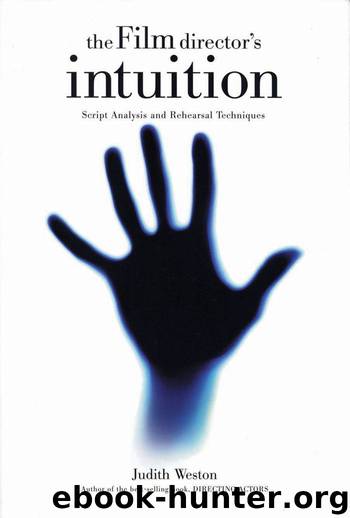The Film Director's Intuition: Script Analysis and Rehearsal Techniques by Judith Weston

Author:Judith Weston [Weston, Judith]
Language: eng
Format: azw3
ISBN: 9780941188784
Publisher: Michael Wiese Productions
Published: 2003-09-25T04:00:00+00:00
III. CHOICES AND IDEAS: OBJECTIVES and INTENTIONS, WHAT JUST HAPPENED, WHAT'S AT STAKE, PROBLEM, OBSTACLE. ADJUSTMENTS and SUBTEXT, IMAGINATIVE BACKSTORY, ISSUES, THROUGH-LINES
What just happened
This scene begins in the middle of a conversation. So what just happened is the conversation off-camera before the scene starts. What topics were they discussing? Was it all small talk? Does the scene begin as soon as anything of substance happens? Or could they have been in the middle of a spirited discussion of politics? In rehearsal we could improvise this “pre-scene beat.”
Adjustments
Here are some possible adjustments a director could suggest to the actors, based on his script analysis preparation.
1) John’s remarks about Graham’s appearance. The actor playing John could make one of several different adjustments to these lines. It could be a big joke that Graham, once a dapper dresser, now looks so scruffy. Or it could be cause for concern to his friend, that he has let himself go this way. Or it could be insulting to John that Graham would accept a dinner invitation in this condition.
2) The idea of parties when Ann has been embarrassed by Cynthia’s raucous behavior is an example of a “what if…?” adjustment. It creates an image to propel the delivery of those lines about Cynthia.
3) When John asks Graham if he plays taxes, I thought of the question: Is John implying that Graham lives on illegal — and therefore untaxed — income, as from drug dealing? Even though there’s no evidence anywhere in the script that Graham has anything to do with drug dealing, it could still be an association in John’s mind when he asks this question. While we are working on a scene, it’s helpful to consider that scene the most important one in the script.
Imaginative Backstory
Here are some ideas for imaginative backstory that came out of my questions and meanderings in Section II:
Graham might be interested in the philosophy of existentialism.
John might have a mother who is charming but emotionally distant.
Ann might look more like her mother than Cynthia does.
I might bring these ideas up when discussing the characters with the actors — but I might not. For instance, if the actor playing Graham has no interest in existentialism, I would let that idea go. But these ideas are helpful to me as a director anyway, even if they never get used, because they add emotional, psychological, and spiritual detail to the characters — and daydreaming those details helps me allow these characters to live in my imagination. And allowing the characters to live in my imagination gives me authority to tell their story.
Issues
We went over some issues in the relationship of Ann and Cynthia. What issues are between Ann and John? One is the issue of over-salting the food. John says, “I keep telling her, you can always add more if you want, but you can’t take it out.” How many times have they had this conversation? Why does Ann keep adding salt to her cooking after John has told her he doesn’t
Download
This site does not store any files on its server. We only index and link to content provided by other sites. Please contact the content providers to delete copyright contents if any and email us, we'll remove relevant links or contents immediately.
| Coloring Books for Grown-Ups | Humor |
| Movies | Performing Arts |
| Pop Culture | Puzzles & Games |
| Radio | Sheet Music & Scores |
| Television | Trivia & Fun Facts |
The Kite Runner by Khaled Hosseini(5163)
Gerald's Game by Stephen King(4640)
Dialogue by Robert McKee(4385)
The Perils of Being Moderately Famous by Soha Ali Khan(4210)
The 101 Dalmatians by Dodie Smith(3505)
Story: Substance, Structure, Style and the Principles of Screenwriting by Robert McKee(3453)
The Pixar Touch by David A. Price(3429)
Confessions of a Video Vixen by Karrine Steffans(3296)
How Music Works by David Byrne(3257)
Harry Potter 4 - Harry Potter and The Goblet of Fire by J.K.Rowling(3057)
Fantastic Beasts: The Crimes of Grindelwald by J. K. Rowling(3049)
Slugfest by Reed Tucker(2996)
The Mental Game of Writing: How to Overcome Obstacles, Stay Creative and Productive, and Free Your Mind for Success by James Scott Bell(2897)
4 - Harry Potter and the Goblet of Fire by J.K. Rowling(2697)
Screenplay: The Foundations of Screenwriting by Syd Field(2635)
The Complete H. P. Lovecraft Reader by H.P. Lovecraft(2553)
Scandals of Classic Hollywood: Sex, Deviance, and Drama from the Golden Age of American Cinema by Anne Helen Petersen(2514)
Wildflower by Drew Barrymore(2484)
Robin by Dave Itzkoff(2434)
